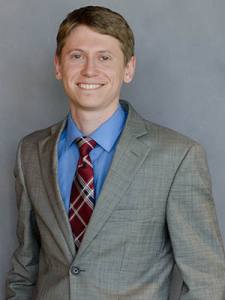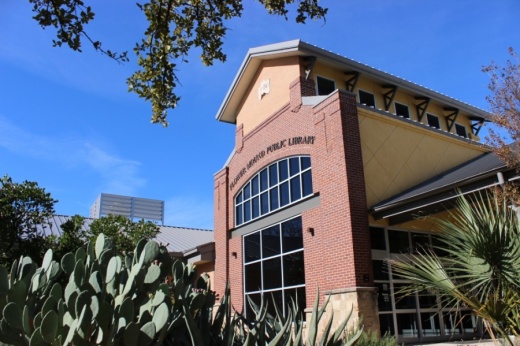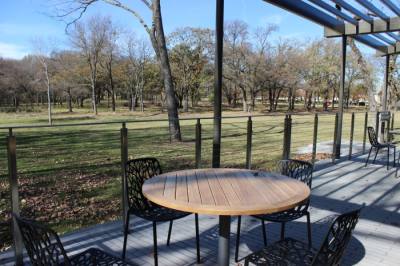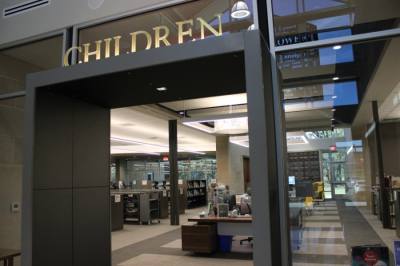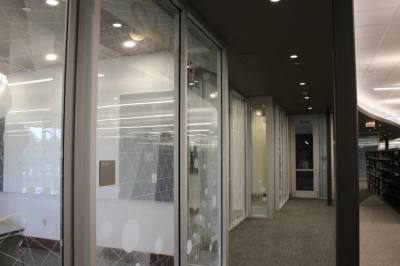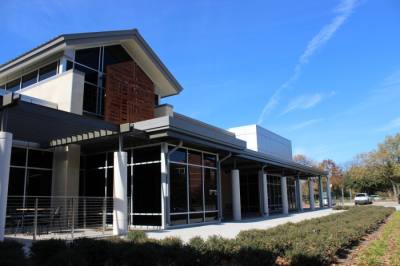Foot traffic at the Flower Mound library returned roughly to pre-pandemic levels in the weeks after the building reopened in November, Director of Library Services Sue Ridnour said. When the coronavirus pandemic comes to an end, she said, the building is expected to house more community activity than ever before.
“We were just running out of room for people to be in the building and use it in [whatever] manner they wanted to use it, and this was particularly obvious in the after-school time period,” Ridnour said. “You could go out to the library in the after-school time period and there would literally not be a chair to sit in.”
The expansion was the product of years of planning that sought to address what town staff identified as the facility’s fundamental issue: The Flower Mound building was well below the statewide average for library space per resident.
When construction began in 2019, the amount of space in the library available to the average Flower Mound resident was a third lower than in the average Texas library system, according to the Texas State Library and Archives Commission. Following the expansion project, the now-40,000-square-foot facility exceeds the statewide average for library space per capita.
As part of the expansion, the library added designated areas for children, teenagers and adults; larger study areas with whiteboards; outdoor patios overlooking trees and fields; new parking lots; and more rooms for various types of programs and events.
The $12.5 million project was funded primarily by revenue from the Flower Mound Tax Increment Reinvestment Zone, a group of properties near the Long Prairie Road corridor on the north side of town.
Nearly $11 million for the project came from the reinvestment zone, which allows for new tax revenue generated in the area to be set aside for public improvements, such as roads or public facilities.
Substantial limitations
The old building ran into consistent problems at peak hours, Ridnour said. Among those was that organizations competing for the same meeting spaces and library users of various ages would have to share common areas.In the old days, the space crunch was particularly hard-felt when high school students arrived after school, Ridnour said.
“A common thing we hear is there’s nothing for teenagers to do in Flower Mound—or, more specifically, no place for them to go,” Ridnour said.
Flower Mound resident Teresa Shively said when her kids were school-age, they would have difficulty finding places for clubs or groups to meet when school facilities were not an option.
“Trying to meet outside of the school was always a struggle,” Shively said.
Teenagers who used the library after school often had to share a smaller amount of space with others.
Now, teenagers have their own specifically designated hangout area, which is located nearby one of the new outdoor patios.
Diane Wetherbee, a Lantana resident who has been working on her doctoral dissertation over the last few years, said that having a quiet place away from home where she can work has been valuable for her.
Before the project, Wetherbee said, she primarily used the Lewisville library for individual research and collaboration. Now, she plans to make more use of the new study areas in the renovated Flower Mound building, which is closer to her home.
“There were so few study rooms [before the expansion],” Wetherbee said. “Even the individual ones ... were always in use. I suspect I will be parking myself there for hours at a time.”
Regional need
Wetherbee is one of thousands of area residents who do not live in Flower Mound but do have a Flower Mound library card. As many nearby municipalities, such as Lantana and Highland Village, do not have library systems of their own, the Flower Mound library provides useful infrastructure and resources for those cities as well, Ridnour said.
Nearly a third of the library’s 41,000 cardholders are not Flower Mound residents, according to the town’s records.
For some Flower Mound residents, such as Shively, the reopening of the library presents an opportunity to browse its collection again, something that was generally not possible during the early days of the pandemic or while construction was in progress. Shively said she sometimes takes an hour or longer to flip through the first chapters of books before checking them out.
“Sometimes, you just need a quiet table somewhere,” Shively said.
Because of the pandemic, some of the new space for adults is currently underused, Ridnour said; however, she does not expect that to continue once virus numbers improve.
“My dream is to go in there someday and see, like, three-quarters of the seats being used,” Ridnour said of the reading room for adults. “Right now, there’s maybe one, two, three people in there.”
Wetherbee said she has used the Flower Mound library since it was at its original location in an abandoned house on Churchill Drive. She said she has watched firsthand as the library has evolved, growing from a small collection of books into a larger gathering space for the community.
“Everyone needs to check out the new space,” Wetherbee said. “The libraries aren’t stuffy places with books anymore. The library is active. It’s energetic. There are so many things to do there. You don’t hear the librarian say, ‘Hush,’ all that often.”


